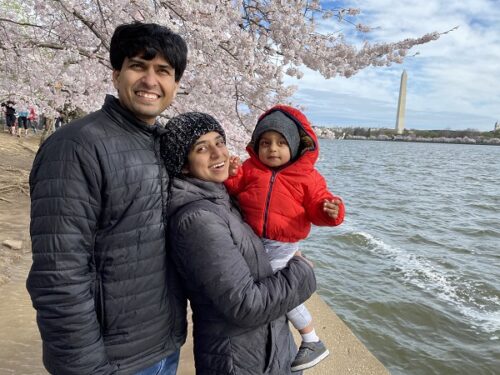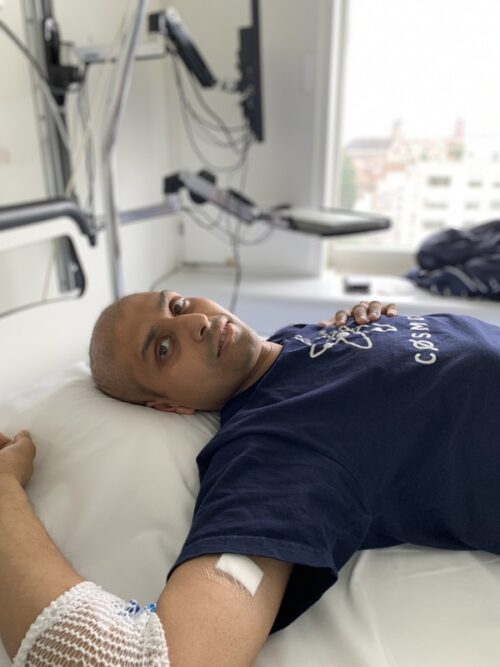In early 2021, Meher Roy was diagnosed with Acute Lymphocytic Leukaemia (ALL) in the nick of time by a routine standard blood test- the Complete Blood Count (CBC). ALL is a type of blood and bone marrow cancer known for its rapid progression.
“Ideally, a CBC is a routine automated test. However, if an unusual discrepancy is found in the readings, the blood work is analysed by a human pathologist under the microscope. In my case, that’s what happened,” he tells The Better India.
Ordinarily, one would expect such a cancer diagnosis to come thanks to severe symptoms or life-altering experiences. But Meher’s story began and continues today because of a simple alteration in the body – an increased resting heart rate.

Leading an aware life
From an early age, Meher’s father inculcated in him a habit of getting regular health checkups. “I don’t know why he did it. My mother went through an episode of illness, which only seemed to reaffirm his belief in the practice. So since my teens, I have kept a basic check on heart, kidney, blood, et cetera,” he says.
Born and brought up in Gandhinagar of Gujarat, Meher has lived in multiple locations like Italy, Germany and the United States over the past 11 years. He co-founded his own company, known as Chorus One and shifted to Switzerland in 2021.
But every winter, he unfailingly visits India for his annual health checkup. According to him, the quality of medical service here is excellent and cheaper compared to other countries.
This behaviour also means Meher has years of data about his own body, which gave him a heightened awareness of what is ‘normal’ for his body and what is not.
The story of how I got diagnosed with blood cancer.
OR
How heart rate monitoring led me to catch a deadly cancer 2 weeks early, and maybe saved my life.
— Meher Roy (@MeherRoy) September 2, 2021
The inception of a life-changing incident
Meher says that this year, he got his annual check-up done on 6 January. He contracted COVID-19 right after that.
“I thought it was best to get another check done after recovery, which was undertaken on 15 February.” Meher shares. “I kept feeling like I lacked energy after the infection. I even got a recurring nose infection. But the oddest thing was that by March-end, my resting heart rate was shooting up. From 55, it reached 90 beats per minute.”
Ordinarily, even this would be attributed to the aftermath of the virus. Nonetheless, Meher decided to get it checked. For as a person who had kept a daily check on his heart rate for years, he knew something was wrong.
“I was in Switzerland by then and got a CBC done there on 13 April. Then, on 14 April, I was asked to come in along with a family member and a few changes of clothes,” says Meher, mentioning the hospital visit was a day before his 33rd birthday.
He was diagnosed with ALL. The cancer cells had penetrated his nervous system. Of the approximately six kg of blood in Meher’s body, 2.5 kg had been infiltrated by cancer cells.
But there was still hope – as the diagnosis had come at such an early stage.
“Many cancers grow so slowly that you might not discover them for ten years. In my case, it had taken only two months for 30-40% of the blood cells to turn cancerous. If I had waited for another two or three weeks, it would have killed me,” Meher relates.
The story of how I got diagnosed with blood cancer.
OR
How heart rate monitoring led me to catch a deadly cancer 2 weeks early, and maybe saved my life.
— Meher Roy (@MeherRoy) September 2, 2021
“The disease was aggressive, so the treatment had to be aggressive too. It is expected to continue for two and a half years in my case. I have already spent about 100 days in the hospital this year,” Meher shares.
This has had its challenges. According to Meher, a cancer patient can never feel normal despite successful therapy. The medicines are tough on the body, and side effects of chemotherapy persist, even as symptoms begin improving.

“In my journey, I have gotten to perceive Switzerland on a deeper level. The doctors, nurses, insurance agencies, and others catered to any requests I had, making this journey easier. For this, I feel gratitude towards them,” he says.
The lessons that saved his life
Meher candidly warns that obsessive assessment can often lead to overdiagnosis and unnecessary questions about one’s health. But he still suggests that every person should undertake simple tracking of bodily functions.
“You should have an understanding of what your body normally feels like, and listen to it and respond when it feels abnormal. These days it can be done with smartwatches that track stats like heart rate and blood pressure,” Meher says.
He adds, “I also recommend consulting a doctor in case something changes. If it’s a fatal disease like cancer, one wrong step (for example, time spent in the wrong kind of therapy) can prove to be life-threatening.”
So, apart from monitoring your body, what kind of tests should you get done?
Dr Preeti Choudhary, a Senior Consultant in Radiology at Jaipur Golden Hospital, shares how awareness about early symptoms and diagnosis can affect the treatment of various cancers. She talks about DR-70, a comprehensive blood test that can identify 13 types of cancers.
Apart from this, a few tests she shares are:
Mammograms to find breast cancer
Colonoscopy to find colon cancer
Medical exams and self-exams to detect other health problems before symptoms appear
So we hope Meher’s story is an example to us all – let’s keep an eye on our body and take steps when something goes wrong.
(Edited by Vinayak Hegde)
No comments:
Post a Comment